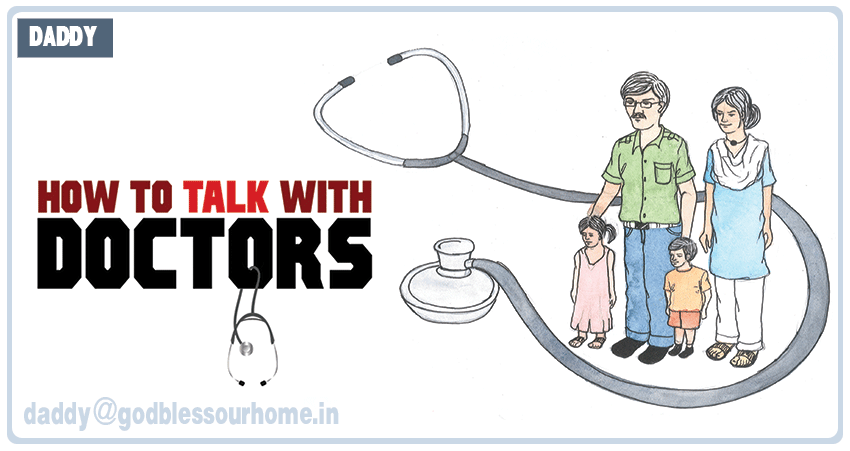

Good relationship with your Doctor is critical component in making sure that you get the care you need and the care that you want. For which you need to communicate effectively with your doctor and that includes asking the right questions and maximizing the time you have with your doctor. Remember, doctors are busy people, but the time you've reserved is your time and you should use it wisely. Here are a few tips on how to establish a great back-and-forth with your doctor. Purpose of this article is to help you get most from your visit to a Doctor. Here are some key suggestions: 1. Doctors say they often encounter patients who are reluctant or embarrassed to talk about their symptoms. That makes the doctor's job a lot harder. Visit to doctors involve lot of waiting period, where as time with doctor can be as little as 10 minutes per visit, considering large number of patients needing her/his attention. Therefore, effective communication is important. Take all recent health documents, x-rays, prescriptions, medical procedures you've had. You should also inform your doctor, about over-the-counter medicines you've been taking such as Aspirin, cough syrup, vitamins and herbs and how regularly you take it. Family's overall health record. Did anyone in your family had BP or diabetes or heart problem? Also list your concerns, allergies and description of symptoms - when they started, what makes them better. 2. You should also take along a trusted friend or family member. Sometimes a third party, can establish good communication bridge between Doctor and patient. Uncommunicative doctors or patients do not show better results. Therefore take proactive steps like taking a friend or relative along on the visit or asking doctors directly about their experience in treating similar cases. Don't give up if all your questions aren't answered during one appointment. Instead, ask the doctor if you can make another appointment, follow up by phone or e-mail, or seek help from another member of their medical team. 3. Always take a prior appointment. If required, you must also take notes during your appointment. Discuss the signs or symptoms. What exactly are they? How lengthy have you felt this way? Is something established of these signs or symptoms? 4. Make sure you understand your diagnosis, tests and any treatments. If you have trouble understanding, ask where you can go for more information. Do tell the doctor about your most pressing concerns as early in the visit as possible. Don't wait until the doctor is on the way out to say, ‘By the way, Doctor...I'm having chest pain,' or ‘My husband is beating me,' or ‘I'm crying all the time.' Discuss your Tests - Why is this test necessary? What will it tell us that we don't already know? Will the results significantly alter any treatment plans? When will the results be ready? Should I call you for them, or will you call me? 5. Discuss your ailment - What is my exact diagnosis? What's the cause of my problem? How long will I be sick? How long before I'll see improvement? Under what conditions should I call you or come back? Discuss your Treatments: What treatments are used for my condition? Which is best for me, and why? What does the research show about this treatment? What can I expect from this treatment, based on your experience? What are the side effects of this medication? Will it interact with alcohol, caffeine, or other drugs or supplements I take? |
6. Make sure you understand how the risks and benefits will affect you specifically. Make sure you have enough information to make a choice. You and your doctor should talk about your options for treatment and make a decision together about the best treatment for you. This process of working together is often called shared decision making. Whenever possible, you should work with your doctor to decide on the best treatment for you. 7. Discuss Lifestyle changes: How will these changes help my disorder? How soon should I expect to see an effect? How drastic do the changes have to be to produce real results? Do you have any tips that would make these changes easier? 8. Don't lecture the doctor about everything you've learned from your relative, friend or internet. Patients don't like to be lectured by doctors; and doctors don't like to be lectured by patients. However, feel free to ask your doctor help you understand what you've learned elsewhere, without disrespecting his expertise. You can ask him “How is this information applicable to me?". Don't let the doctor do all the talking. If something is not clear, you can say, ‘I'm sorry, doctor, I didn't understand you. Can you explain that again?’You may take notes or ask to use a voice recorder, with doctor's permission. Most doctors won't mind if you explain that you want to remember the conversation or share it with loved ones. 9. Efforts of Baba Ram Dev and many others have helped alternative medicine emerge out of argument of lack of scientific evidence. Acupuncture, massage, guided imagery, relaxation training, therapeutic touch, tai chi, and yoga are now used in clinics and hospitals alongside conventional treatments. Indeed, such methods are now often called “Complementary" or “Integrative" medicine. Asking your doctor about alternative treatments is something that should be considered. Last but not the least - A patient-doctor relationship is not just a shop-keeping relationship, it's emotional, personal and intimate as well. At least say “Thank you" to your doctor, from time to time. |
|---|








